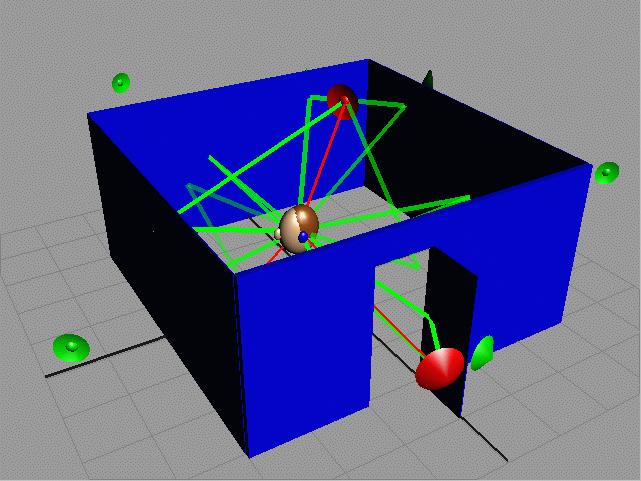|
Home <
Products <
AuSIM3D
|
AuSIM3D®
Technology, Engine, and Interface for Audio Simulation and Aural Displays
|
|
|
|
|
|
| |
|
AuSIM's trademark "AuSIM3D" denotes
a technology, an engine, and an interface to the technology running on the engine.
|
|
-
AuSIM3D® Technology
The AuSIM3D® technology
is a set of mathematical algorithms, implemented in robust, object-oriented
software that simulate the propagation of audio
from an imaginary emitter (or "sound source")
through a modeled environment
to a human listener (or "sound sink").
These mathematical algorithms are a hybrid of physically-based models
and empirically-measured approximations.
Over the last dozen years, positional 3D audio models have evolved
to leverage more of physics, yielding better realism.
AuSIM3D® is the most
physically-based 3D audio technology that exists.
AuSIM3D®
builds an audio simulation from four components:
signal generation,
sound source emission,
wave propagation,
and sound perception.
-
Signal Generation
The field of signal generation is very large, mature, and well-established.
Today synthetic signal generation is achieved by one of three different models:
frequency modulation (FM Synthesis),
sample superposition (Wavetable Synthesis),
and physically-based models.
Currently, AuSIM3D®
contains some rudimentary FM signal generators and
full support for the replay and modulation of sampled waveforms.
But the future of AuSIM3D®
is in directly coupling physically-based synthesis to AuSIM's
physically-based propagation models.
At present, AuSIM3D®
can be interfaced with Stanford CCRMA's Synthesis Toolkit (STK) as well as
NCSA's Vanilla Sound Server (VSS).
-
Sound Source Emission
Proper modeling of how sound waves propagate away from its emitter
is essential for realistic perception of the image.
While AuSIM plans major advances in sound source propagation models,
AuSIM3D®
already supports the most advanced models of any
commercially-available aural simulation system.
-
Sound Wave Propagation
 Simulating the propagation of sound waves
through a complex 3D geometric environment
is AuSIM's bread and butter.
Unfortunately, we are keeping you in suspense until the model is finished.
In the meantime, AuSIM3D®
implements a distance model
which assumes a constant propagation medium between sound source and sink.
Simulating the propagation of sound waves
through a complex 3D geometric environment
is AuSIM's bread and butter.
Unfortunately, we are keeping you in suspense until the model is finished.
In the meantime, AuSIM3D®
implements a distance model
which assumes a constant propagation medium between sound source and sink.
-
Sound Perception
Human perception is very difficult to fool,
making this final stage the most important.
AuSIM3D®
takes a listener-centric approach,
implementing its own twist on head-related transfer function (HRTF) methods.
AuSIM's HRTF implementation is a hybrid between measured impulse responses
and parametric physically-based models of the human hearing system.
The result of AuSIM3D®
technology is a summary signal from the whole aural environment
as it should be descending the listener's ear canals.
Most HRTF-based positional 3D audio methods are actually only
two-dimensional ...
depending on only the radial vector between a sound and the listener.
AuSIM3D®
implements a near-field model,
providing an approximate effect for sounds
that originate within arm's length of the listener.
The AuSIM3D® technology
is all original,
built fresh from the ground-up
leveraging a dozen years of experience with interactive, positional 3D audio.
While both AuSIM and
AuSIM3D® are relatively new,
the models comprising the technology have been refined
through four generations.
Finally, it should be acknowledged that
AuSIM3D® also leverages five decades
of very excellent psychoacoustic and signal processing research.
|
|
-
AuSIM3D® Engine
The AuSIM3D® Engine is the implementation
of the technology in tangible form.
In its fourth generation the engine is written in high-level,
object-oriented computer code,
so as to be most portable to any platform and thus fit in any package.
The experience building the legendary CRE Convolvotron
(circa 1987-1992),
the CRE Acoustetron
(circa 1992-1996),
and the Aureal Vortex
(circa 1997-1999)
has burned in the fact that engine must be light on its feet
and readily adapt to the fast changing world around it.
Despite the high-level code base, the
AuSIM3D® Engine
is impressively fast and efficient.
AuSIM's partnership with Intel has allowed the same code base
to optimally perform on any platform from the ultra portable X-Scale
processor line up to the Itanium2.
|
|
-
AuSIM3D® Interface
As an interface, AuSIM3D®
represents an Application Programming Interface (API),
by providing a collection of software objects.
When instantiated, these objects can define a virtual aural environment
and thus form a program for AuSIM3D®
technology to follow.
At the time of this writing,
the AuSIM3D® API
is still being finalized,
and is planned to be published with AuSIM's acoustic simulation model
within the next four quarters.
Don't fear however.
The AuSIM3D® technology
is accessible through a wrapper
of Crystal River Engineering's popular
CRE_TRON "C" API.
Hence current users benefit from this elegant design under the hood.
The CRE_TRON API
is supported by a dozen commercial applications and
toolkits, as well as used in hundreds of user applications around the world.
|
| |


